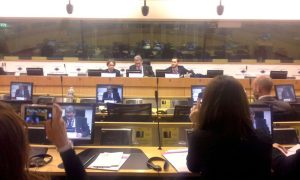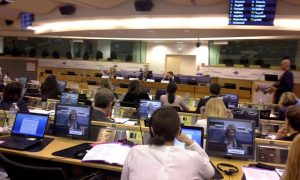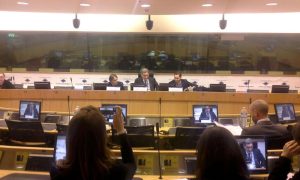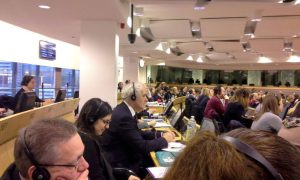Conference “Boosting the entrepreneurial spirit – pioneering regions and cities in Europe”
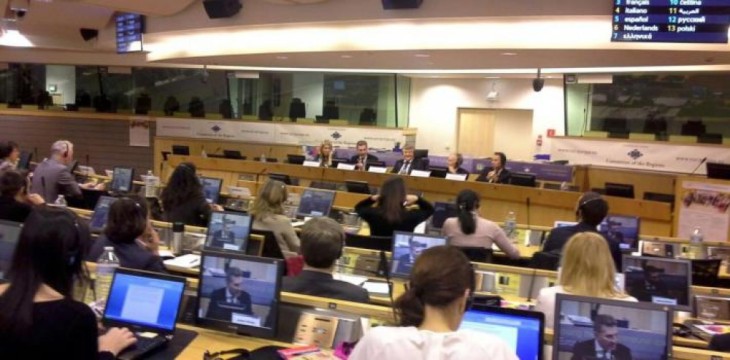
The European Committee of the Regions (CoR) organised the conference “Boosting entrepreneurial spirit – pioneering regions and cities in Europe” in Brussels on 9th February 2016, given that the one of the current key challenges in Europe is to renew and stabilize economic growth and find new, innovative and creative solutions to strengthen its competitiveness. Cities and regions are rapidly taking their place as the engines and powerhouses of new economic growth. However, many of them have an insufficient understanding of the functioning and thinking of entrepreneurs and enterprises, or they lack the entrepreneurial mind-set needed to design and implement policies conducive to stronger growth and job creation. One of CoR’s key objectives is to build a bottom-up process of boosting the entrepreneurial spirit in Europe’s regions and cities.
The conference built on the experiences of the European Entrepreneurial Regions (EER), sharing and showcasing the benefits of entrepreneurial spirit. It welcomed policymakers and experts from public administration, development agencies, entrepreneurial organizations and other stakeholders, who took part in an interactive debate on the political framework and discussed the experiences presented by pioneering entrepreneurial regions.
Opening the conference, Markku Markkula, President of the CoR, said that regions and cities needed incentives to take more action, especially in the new Digital Single Market initiative in 2016 in order to boost the entrepreneurial spirit. Work should be done by commencing the implementation of the CoR policy guidance, promotion of new ways of production and stimulating the European eco-system and socio-economic environment. Europe is lacking behind the other parts of the world, including the USA. Moreover, according to the survey, there are good entrepreneurial preconditions in Slovenia, Lithuania and Finland, but what will happen when China and India break out to the top of the list? The goal is to make the urban agenda and ecology more innovative, having in mind that it is children who will change the world. Europe needs to cooperate more with Chinese cities, as they are advancing towards innovation investment, with a number of success stories. He concluded with the main ideas that need to serve as guidance: entrepreneurs’ stimulation of innovation, change in mentality following the bottom-up approach. In this respect, he referred to the winners of the EER award as role models for regions and cities across the EU.
Günther Oettinger, European Commissioner for Digital Economy and Society, stated that Europe is still in the budgetary and partially in the banking crisis, and when comparing the growth rates in the US, which are 2.5% annually, with those in Europe, 0.1 to 0.8%, and given the situation on the labour market, it is obvious that more needs to be done. Balanced taxation is the key for future development and a good strategy for promoting entrepreneurship, new companies and competitiveness. The establishment of companies varies between states and within the states because of different entrepreneurial culture. The best practices of most developed regions need to be shared, so that they could serve as lessons to others, and it can be facilitated by the CoR, jointly with the European Commission. The education of young people is crucial. Nowadays, not many young people are keen on having their own company and being entrepreneurs. Education needs to head towards autonomy: successful entrepreneurs should be actively involved in teaching, in order to present pupils and students with positive examples to follow. Banks that are ready to risk and finance new ideas, like those in the US, are needed. In this sphere, Piedmont and Bavaria are good examples in Europe. The companies that created the digital revolution, such as Apple, Google and Facebook were start-ups 10-15 years ago, but Europe still lacks such kinds of companies. The Commissioner concluded that Europeans are as creative as Americans, but Europe still needs more entrepreneurial networks.
Dominique Riquet, MEP said that the attractiveness for innovation and entrepreneurial spirit involved many aspects which need to be fulfilled. It is important to create the right circumstances and provide support to keep well-educated and innovative entrepreneurs in the regions. He added that it is difficult to create a competitive individual in line with the needs of the modern labour market.
Constance Kann, Director of the Brussels Office of the European Investment Bank (EBI), reaffirmed that entrepreneurs are a priority for EBI. Good ideas are not lacking, but the challenge is to support them and give them financial and digital support. The EU institutions created the COSME and INNOFIN mechanism for entrepreneurial support. Statistics has shown that EBI already financed 1050 projects with 168 billion EUR in credits and guaranties in the last 5 years, out of which more than 30% were for micro-finance and SMEs. Europe is facing challenging financial circumstances and it is necessary to find alternatives to funding provided only by the banks, existing regulatory obstacles and national fragmentation. She added that Europe needs to absorb new technologies and ideas and transform them into upgraded projects.
Arnaldo Abruzzini, Secretary-General of Eurochambers, said that he does not see a problem of entrepreneurial spirit and innovation but a difference in performance and capacity and therefore the need for better support. Regulatory burdens need to be lightened, so as not to prevent the implementation of new ideas.
Raffaele Cattaneo, President of the Lombardy Regional Council, and Chairs of the CoR Commission on Territorial Cohesion Policy, stated that half of the patents in Italy are from Lombardy and the biggest innovative companies. Lombardy is in the top 20 innovative territories in Europe, with 5 million entrepreneurs in Italy, making 1 in 12 Italian an entrepreneur. In order to maintain the entrepreneurship, better conditions for the business community and a circle of trust among all actors need to be created, and social and cultural values for doing business need to be enhanced. Innovation is the key factor to maintain excellency in the future and regions need to support innovations, as a process of transformation. Lombardy promotes better access to credits and finance, research and innovation, close relations among universities, research institutions and business community, and supports the globalization of companies. Europe needs open-minded entrepreneurs who can look at the world scene. He concluded that support for companies needs to be delivered in every stage of their lives, including the application of the Smart Specialization Strategy, as an investment support mechanism.
Dimitri Corpakis, Head of Unit, DG Research and Innovation, said that it is almost impossible to re-create some good example, such as the silicon valley, in other parts of the world because a lot of segments need to be fulfilled, including work at all levels and setting knowledge and innovation as a pivotal value of the surrounding eco-system. A sound economic base, talent, innovation, ideas and incentives for entrepreneurship, as well as interconnection among the elements are needed. Smart specialization strategies are a mechanism to achieve that and the main work is in the implementation sphere. The DG for Research and Innovation will apply the Triple Helix (university-business-government) approach. To achieve the defined, the European Commission has planned 100 billion EUR under ESI Funds for open and inclusive innovation, 80 billion EUR under HORIZON 2020 and 2.3 billion EUR under the COSME programme. The statistics shows a success story with Horizon 2020, with over 15 billion EUR spent in 2014-15 in more than 100 open calls, with 36 000 project proposals evaluated and 3200 projects that have started with the implementation.
Lowri Evans, Director-General for Internal Market, Industry, Entrepreneurship and SMEs at the European Commission, said that the focus needs to be on cultural aspects, attractiveness and acceptance. Young people need to think of it positively and practical experience needs to be gained before leaving school. Erasmus for Young Entrepreneurs aims at the transfer of knowledge to start and run a business.
Charlina Vitcheva, Director for Smart and Sustainable Growth, DG for Regional and Urban Policy at the European Commission, said that the Cohesion Policy is not only a funding policy, but also a technical and methodological support to all the interested. Smart projects need to be implemented in line with smart specialization strategies. The DG for Regional and Urban Policy targets involve 2 million enterprises, boost of competitiveness and development of new products, new jobs and access to markets. Support has been and will be given to SME innovation, creation of new incubators, process design, university-business cooperation, clusters. The figures are targeting 1.1 million SMEs that will receive support to increase productivity, creation of 500 000 new jobs, 150 000 entrepreneurs networked for joint research and 150 000 start-ups. She concluded that the funds need to be used smartly and efficiently, while working together.
Josette Dijkhuizen, Professor for Entrepreneurship Development at the Maastricht School of Management, emphasized the importance of bringing entrepreneurs, policy-makers and academics together. She indicated that migrants and women need to be included in the market of entrepreneurs, as knowledge and values can be learnt.
